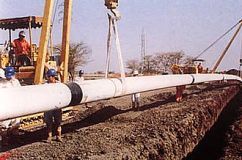Sudan to open new oil pipeline
April 5, 2006 (KHARTOUM) — Sudan’s oil production is more than 300,000 barrels per day (bpd) and will rise to half a million bpd on April 10 with the long-delayed opening of a new pipeline, an oil ministry official said on Wednesday.

After years of north-south civil war fuelled by what southerners call northern exploitation of Sudan’s oil reserves which are mainly in the south, the foes signed a peace deal last year enshrining wealth and power sharing.
But disputes have arisen over the amount of oil produced in a sector where Western companies have withdrawn over allegations of rights abuses and Chinese and Malaysian companies now operate. There is little transparency in Sudan’s energy sector and under the deal the south should receive 50 percent of oil revenues from southern fields.
The newly-appointed and highest southern representative at the oil ministry, Angelina Teny, has said crude production is 500,000 bpd. But the energy ministry has officially maintained it is around 330,000 bpd.
Teny is the wife of the vice president of the new autonomous southern government, Riek Machar.
Sources in the oil ministry said production would rise to 500,000 bpd with the opening of a new pipeline run by a conglomerate called Petrodar.
“On April 10 we will travel to Upper Nile to celebrate the opening of the Petrodar pipeline,” said an oil minsitry official. The pipeline will take crude from the Melut Basin to the east, Port Sudan.
Sources in the oil business in Khartoum said the pipeline had been much delayed by faulty foundation work. It was due to come on line in August last year.
Petrodar is a partnership of made up mainly of China’s state-owned CNPC and Malaysian Petronas with smaller shares for Chinese SINOPEC, Sudanese Sudapet and Dubai-based company al-Thani.
It works mostly in the southeastern Upper Nile region of Sudan. The main oil areas of Upper Nile and Abyei remain the most troubled despite the peace deal.
Southern First Vice President Salva Kiir on Monday accused his northern partners of continuing to support southern militias against the SPLA.
(Reuters)
